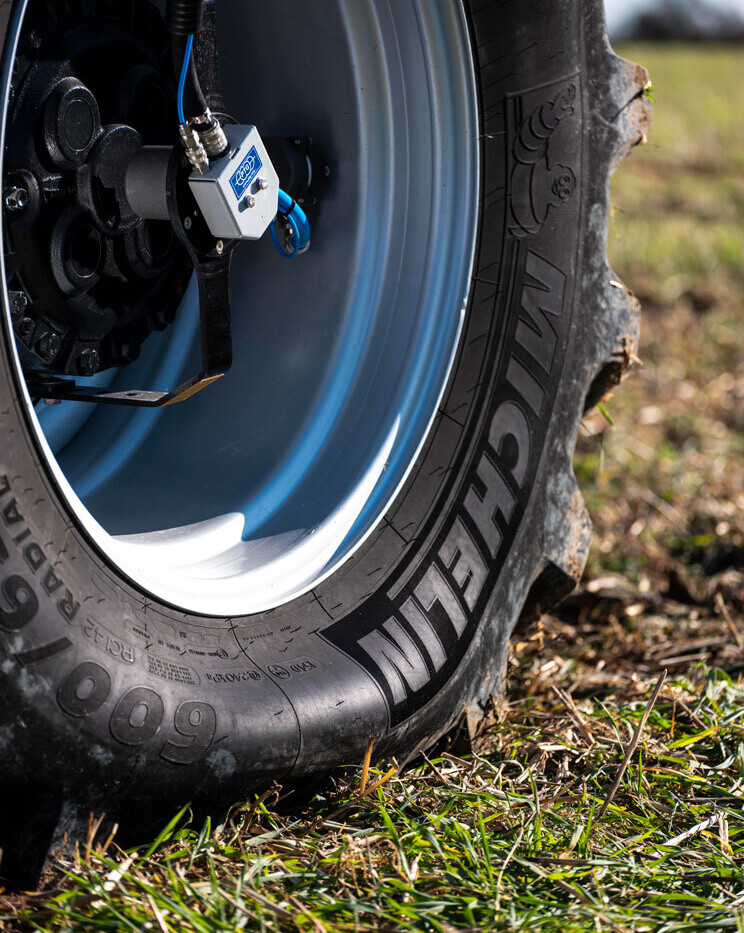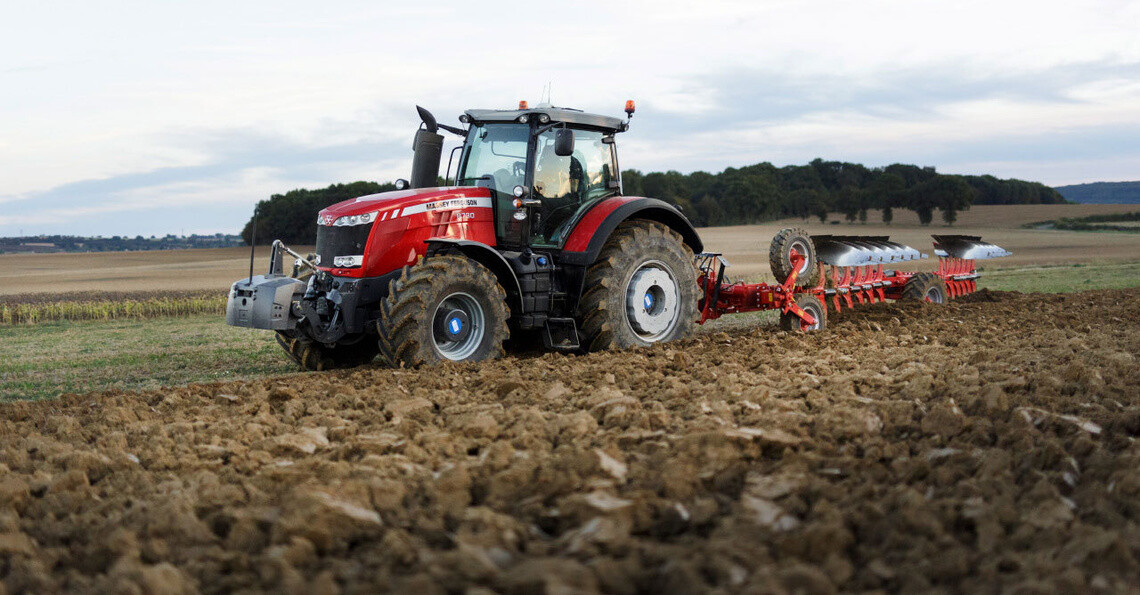
Tractor tire pressure can be crucial to your productivity
How to find the correct tire pressure for your tractor
Tractor tire pressure matters! Having the wrong pressure can hurt your wallet and your fields. Lower pressure is good for working in the soil (less compaction) but can waste fuel and wear tires faster if not calibrated correctly. Higher pressure is better for roads (saves fuel and reduces wear) but hurts the soil if not corrected when going from road to field.
So, what's the right air pressure? It depends on what you're doing with your tractor. This article will explain how to manage tire pressure for different tasks to:
- Save money on fuel and tires
- Get more work done by reducing wear and tear
- Protect your soil for better crop yields
Keep reading to learn how to get the most out of your tractor tires!
SUMMARY:
What is the correct tire pressure for your tractor?
Unlike car tires, tractor tire pressure isn't a one-size-fits-all. It depends on three key factors:
- Load: How much weight the tractor is carrying. Heavier loads require higher pressure.
- Speed: Whether you're working the fields (slower) or traveling on the road (faster). Higher speeds need higher pressure.
- Use: What task the tractor is performing. Fieldwork needs lower pressure to avoid soil compaction, while road travel requires higher pressure for fuel efficiency and wear reduction.
Finding the perfect balance can be tricky, but there's help! Michelin offers a free tool called MICHELIN AGROPRESSURE. This online calculator considers all three factors (load, speed, and use) to recommend the optimal tractor tire pressure for your specific situation.
By using the calculator and understanding the pressure impact, you can:
- Save money on fuel and tire replacements.
- Maximize your productivity by reducing downtime due to tire issues.
- Protect your soil for better crop health and future harvests.
Here's the challenge: The recommended tire air pressure for the field will be different from the road pressure. This is because the speed (and sometimes the load) changes depending on the task.
Solution 1: CTIS - The pressure adjuster on the go!
If you have a Central Tire Inflation System (CTIS), you're lucky! This comprehensive system lets you adjust tire pressure directly from your cab while switching between field and road.
Solution 2: No CTIS? Prioritize safety with a single pressure.
If you don't have CTIS, here's a crucial tip: Always choose the higher pressure recommended by Michelin AgroPressure (e.g., 0.8 Bar or 12 PSI for field and 1.4 Bar or 20 PSI for road: choose 1.4 Bar or 20 PSI). While slightly over-inflated tires on the field won't impact safety, under-inflated tires on the road can be dangerous.

Tractor tire pressure management with ctis
What is the right tractor tire pressure to reduce soil compaction?
As mentioned above, without CTIS, it is best to choose the highest recommended tire air pressure; however, this can lead to problems in the field, as smaller tractor tire footprints compared to ideal pressure have negative consequences on the soil. Primarily, lowering productivity due to increased slippage rate, soil compaction and rutting.
With a CTIS system on your tractor, you can easily adjust your tire pressure right from the driver's seat. This ensures you're always using the perfect pressure for the job, no matter if you're traveling on the road or working in the field.
Watch the Soil Conditions:
- Soil firmness changes throughout the year due to weather. When it's dry and hard, you can use higher tire pressures. But on soft, wet ground, lower the pressure to avoid damaging the soil.
Think about Footprint:
- Lower tire pressure in the field creates a larger "footprint" on the ground. This spreads the weight of the tractor out more evenly, preventing soil compaction which can suffocate plant roots and harm future crop yields.
This reduces soil compaction and increases crop yields. Several studies* have been performed by universities around the world, proving that, on average, agricultural yields are improved by 2% to 6% because of MICHELIN Ultraflex Technology, enabling low-pressure work.
Other factors that can affect tractor tire pressure
Other factors can influence how much air you need in your tractor tires:
-
Doubling Up Tires (Twinning): When you twin tractor tires, you essentially create a wider double tire. This increases the air volume per axle. Because of that, you can work with lower air pressure while still carrying the same weight.
Tractor Tire Ballasting vs. Weighting:
- Tire Ballasting: This involves adding liquid (like water) to the tires, increasing grip weight for better performance. The good news is that ballasting doesn't add extra load to the axle, so you can maintain lower tire pressures.
- Tire Weighting: Adding weights directly to the wheels increases the axle load itself. To compensate for this extra weight, you'll need to use higher tire pressures.
When should you check your tire pressure?
There are two important situations that require additional tire pressure checks:
1 - Check your tractor tire pressure every time you attach a new implement
Tire pressure always depends on your load, speed and your use.
Since you are attaching a new implement, we will focus on load: This one can be tricky. The weight of your tractor matters, but so does the weight of the implements you're using (plow, planter, etc.). MICHELIN AgroPressure, a handy online tool, can help you figure out the total load based on your specific equipment + implements.
Remember, tractor tire pressure isn't set-and-forget. Make sure you are following recommended guidelines by your tractor and implement manufacturer.

check your tractor tire pressure every time you connect a new implement
2 - Always connected to the same implement? Check your tractor tire pressure once a month.
Over time, tires naturally lose air pressure. If you always use the same implement, we recommend that you check your tractor tire pressure once a month to make sure it's still optimized for your usage.
Should your tire air pressure be checked when tires are cold or hot?
Think of your tires like mini balloons! Just like a balloon expands with heat, air pressure inside your tires increases when they get hot. This can happen from driving for a long time: the friction from the road warms up the tires or sitting in the sun: sunshine can directly heat the air inside the tires.
Why does this matter? To measure tire pressure when it's most accurate, it's best when the tires are cold. This means they haven't been driven for a long time or been sitting in direct sunlight.
So, the best time to check your tire pressure is early morning, before you start driving, at least a few hours after your last run, or if you must check immediately after driving, find a shaded area.
By checking pressure when the tires are cold, you get a more precise reading and ensure your tires are properly inflated for optimal performance and safety.
How to properly check your tractor tire pressure
To check your tractor tire air pressure, we recommend that you use a tire pressure gauge designed for tractor tires, ideally one that is independent from other tools (i.e. not connected to a compressor) as this may impact the accuracy of the reading.
First, release air from the valve to discharge any residual humidity before connecting the pressure gauge. This will prevent the gauge from giving an inaccurate reading and protects the tire if ballasted with water. To release air, simply press down on the valve piston with a pointed object (a nail or screw, for example).
Also, remember to calibrate your air pressure gauge regularly (once a year if possible). When in doubt, take it to your local agriculture dealer for assistance.
Find your perfect tire pressure in minutes with the MICHELIN AGROPRESSURE tool
Need additional information? Explore our tire pressure resources
*A study carried out by Harper Adams University in the UK from 2013 to 2017, demonstrates that MICHELIN ULTRAFLEX technology increases agronomic yields from 2 to 6%. These results are confirmed by similar studies carried out in the United States (Illinois) in 2015 and Brazil (Mato Grosso) from 2018 to 2021.




